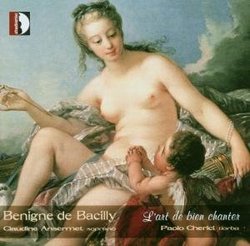| All Artists: Benigne de Bacilly, Charles Mouton, Claudine Ansermet Title: Bénigne de Bacilly: Airs Members Wishing: 0 Total Copies: 0 Label: Stradivarius Original Release Date: 1/1/2006 Re-Release Date: 10/10/2006 Album Type: Import Genres: Pop, Classical Styles: Vocal Pop, Chamber Music, Historical Periods, Baroque (c.1600-1750), Classical (c.1770-1830) Number of Discs: 1 SwapaCD Credits: 1 UPC: 8011570337207 |
Search - Benigne de Bacilly, Charles Mouton, Claudine Ansermet :: Bénigne de Bacilly: Airs
 | Benigne de Bacilly, Charles Mouton, Claudine Ansermet Bénigne de Bacilly: Airs Genres: Pop, Classical
Benigne de Bacilly (1625-1690) was a talented poet, composer, and singer who excelled in all types of airs. Between 1661 and 1688 he published secular and religious airs for solo voice and basso continuo. He devoted his... more » |
Larger Image |
CD Details
Synopsis
Album Description
Benigne de Bacilly (1625-1690) was a talented poet, composer, and singer who excelled in all types of airs. Between 1661 and 1688 he published secular and religious airs for solo voice and basso continuo. He devoted his whole life to reforming French song and his treatise "L'art de bien chanter" (1668) is his major manifesto, laying down a theory of French pronunciation. The present recording is an anthology of secular and religious airs, each of which is preceded by a piece for lute by Charles Mouton, a lutenist and contemporary of Bacilly's. Mouton's stylized dances are well suited to Bacilly's airs, since both have a number of points in common (including sources) and because of the decisive influence of dance rhythms on most French vocal works. Paolo Cherici plays a theorbo, close relative of the lute, and often used in place of it in that era.

 Track Listings (29) - Disc #1
Track Listings (29) - Disc #1